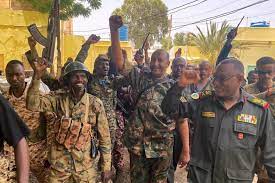Sudan ceasefire extension results in more fighting and little aid
Fighting flared again in Sudan on Tuesday despite the latest ceasefire pledges of the two warring generals, meant to allow desperately needed aid to reach besieged civilians.
US and Saudi mediators announced late Monday that the army and the paramilitary Rapid Support Forces had agreed to extend by five days the humanitarian truce they frequently violated over the past week.
Since the extension announcement, residents reported “clashes with various kinds of weapons in southern Khartoum”, and fighting in Nyala, South Darfur’s state capital.
“There is no ceasefire in Sudan,” analyst Rashid Abdi, a fellow with the Rift Valley Institute, said on Tuesday.
Writing on Twitter, he pointed to “a deep disconnect between the reality on the ground in Sudan and diplomacy in Jeddah”, where the mediators had brokered the truce between army leader Abdel Fattah al-Burhan and his former deputy, RSF commander Mohamed Hamdan Daglo.
The mediators admitted the truce had been “imperfectly observed” but said the extension “will permit further humanitarian efforts.”
The war has killed more than 1,800 people, according to the Armed Conflict Location and Event Data Project.
More than a million have been internally displaced and nearly 350,000 have escaped to other countries, the UN said.
Residents have been hiding from street combat and roaming looters in the capital city of more than five million, nearly 700,000 of whom have fled, according to the United Nations.
Since battles began on April 15, both generals have committed to a series of truces, though the United States and Saudi Arabia said this seven-page deal is different because the warring parties signed it, and there is a monitoring mechanism.
Although some Sudanese have used relative lulls in the fighting to escape, aid has only trickled in.
The United Nations warned on Monday that Sudan has become one of the highest alert areas for food insecurity, requiring “urgent” international action.
– Malnourished children –
Sudan was already poverty-stricken before the war, with a third of its 45 million people relying on aid.
More than six weeks of war have made things much worse. More than half the population — 25 million people — are now in need of aid and protection, the UN says.
Among them are 13.6 million children, including 620,000 suffering from severe acute malnutrition, “half of whom may die if not helped in time”, the UN children’s agency said.
Sudan’s already crippled economy has collapsed since the war broke out, with businesses shuttered, agri-food factories burned and warehouses looted.
Employees of Haggar Group — one of the largest investors in the Sudanese economy and main actors in the agriculture sector — received a notice Monday that the company was “suspending operations” and letting employees go.
Entire districts of Khartoum no longer have running water, electricity is only available for a few hours a week, and three quarters of hospitals in combat zones are out of service.
What few health facilities still operate have practically run out of medicines and equipment and have to purchase fuel at up to 20 times its pre-war price to keep generators running.
But with staff and transport blocked by fighting and shipments stuck in customs, aid agencies have so far only managed to deliver relatively small quantities of food and medicine to conflict areas.
On Sunday the UN said 53 trucks with life-saving supplies — around one-third of those planned — had been able to reach their destinations since the truce began.
The fighting sparked mass evacuations of thousands of foreign nationals in the initial weeks, while many abandoned foreign diplomatic facilities were ransacked.
In the latest such attack, Libya’s foreign ministry on Tuesday denounced “the assault and looting” of its Khartoum embassy.
– Fears of ‘civil war’ –
The situation is particularly dire in Darfur, the vast western region already ravaged by two decades of war and civil strife.
Activists and aid workers say Darfur civilians continue to be attacked, entire districts have been burned to the ground, and tens of thousands have been forced to flee into neighbouring Chad.
The UN has warned for weeks that fighting in Darfur’s major cities between the army and the RSF has also drawn in local militias, tribal fighters and armed civilians.
Darfur’s pro-army governor Mini Minawi, a former rebel leader, has urged citizens to “take up arms” to defend their property.
Sudan could descend into “total civil war”, warned the Forces for Freedom and Change, the main civilian bloc ousted from power by Burhan and Daglo in a 2021 coup.
“We must arm ourselves,” a Darfur resident, Abubakr Ismail, told AFP. “It’s an impossible situation. People are completely alone. They’re being attacked in their homes and they can’t do anything.”
But another resident contacted by AFP, Mohammed Hassan, said such “totally irresponsible” appeals are dangerous and “can lead us into civil war”.

maryagyepomaa
Keep goes no